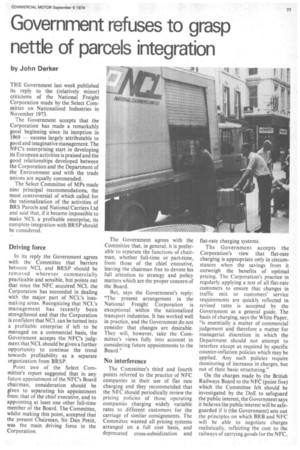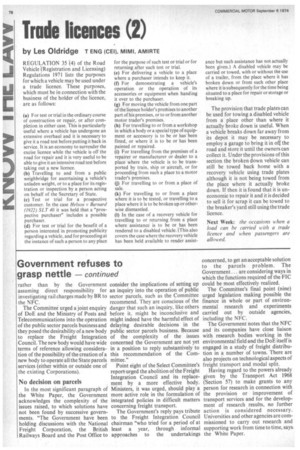Government refuses to grasp nettle of parcels integration
Page 79

Page 80

If you've noticed an error in this article please click here to report it so we can fix it.
by John Darker THE Government last week published its reply to the (relatively minor) criticisms of the National Freight Corporation made by the Select Committee on Nationalized Industries in November 1973.
The Government accepts that the Corporation has made a remarkably good beginning since its inception in 1969 — success largely attributable to good and imaginative management. The NFC's enterprising start in developing its European activities is praised and the good relationships developed between the Corporation and the Department of the Environment and with the trade unions are equally commended.
The Select Committee of MPs made nine principal recommendations, the most controversial of which called for the rationalization of the activities of BRS Parcels and National Carriers Ltd and said that, if it became impossible to make NCL a profitable enterprise, its complete integration with BRSP should be considered.
Driving force
In its reply the Government agrees with the Committee that barriers between NCL and BRSP should be removed wherever commercially practicable and sensible, but points out that since the NFC acquired NCL the Corporation has succeeded in dealing with the major part of NCL's lossmaking areas. Recognizing that NCL's management has recently been strengthened and that the Corporation is confident that NCL can be turned into a profitable enterprise if left to be managed on a commercial basis, the Government accepts the NFC's judgment that NCL should be given a further opportunity to continue the trend towards profitability as a separate organization from BRSP.
Point two of the Select Corn-. mittee's report suggested that in any future appointment of the NFC's Board chairman, consideration should be given to separating his appointment from that of the chief executive, and to appointing at least one other full-time member of the Board. The Committee, whilst making this point, accepted that the present Chairman, Sir Dan Pettit, was the main driving force in the Corporation. The Government agrees with the Committee that, in general, it is preferable to separate the functions of chairman, whether full-time or part-time, from those of the chief executive, leaving the chairman free to devote his full attention to strategy and policy matters which are the proper concern of the Board.
But, says the Government's reply: "The present arrangement in the National Freight Corporation is exceptional within the nationalized transport industries. It has worked well in practice, and the Government do not consider that changes are desirable. They will, however, take the Committee's views fully into account in considering future appointments to the Board."
No interference
The Committee's third and fourth points referred to the practice of NFC companies in their use of flat rate charging and they recommended that the NFC should periodically review the pricing policies of those operating companies charging widely variable rates to different customers for the carriage of similar consignments. The Committee wanted all pricing systems arranged on a full cost basis, and deprecated cross-subsidization and flat-rate charging systems.
The Government accepts the Corporation's view that flat-rate charging is appropriate only in circumstances when the savings from it outweigh the benefits of optimal pricing. The Corporation's practice in regularly applying a test of all flat-rate customers to ensure that changes in traffic mix or customers' service requirements are quic,kly reflected in revised rates is accepted by the Government as a general guide. The basis of charging, says the White Paper, "is essentially a matter of commercial judgement and therefore a matter for managerial discretion in which the Department should not attempt to interfere eicept as required by specific counter-inflation policies which may be applied. Any such policies require , monitoring of increases in charges, but not of their basic structuring."
On the charges made by the British Railways Board to the NFC (point five) which the Committee felt should be investigated by the DoE to safeguard the public interest, the Government says it believes the public interest will be safeguarded if it (the Government) sets out the principles on which BRB and NFC will be able to negotiate charges realistically, reflecting the cost to the railways of carrying goods for the NFC, rather than by the Government assuming direct responsibility for investigating rail charges made by BR to the NFC.
The Committee urged a joint enquiry of DoE and the Ministry of Posts and Telecommunications into the operation of the public sector parcels business and they posed the desirability of a new body to replace the Freight Integration Council. The new body would have wide terms of reference allowing consideration of the possibility of the creation of a new body to operate all the State parcels services (either within or outside one of the existing Corporations).
No decision on parcels
In the most significant paragraph of the White Paper, the Government acknowledges the complexity of the issues raised, to which solutions have not been found by successive governments. "The Government have been holding discussions with the National Freight Corporation, the British Railways Board and the Post Office to consider the implications of setting up an inquiry into the operation of public sector parcels, such as the Committee recommend. They are conscious of the danger that such an inquiry, like others before it, might be inconclusive and might indeed have the harmful effect of delaying desirable decisions in the public sector parcels business. Because of the complexity of the issues concerned the Government are not yet in a position to reply substantively to this recommendation of the Committee."
Point eight of the Select Committee's report-urged the abolition of the Freight Integration Council and its replacement by a more effective body. Ministers, it was urged, should play a more active role in the formulation of integrated policies in difficult matters concerning freight transport.
The Government's reply pays tribute to the Freight Integration Council chairman "who tried for a period of at least a year, through informal approaches to the undertakings concerned, to get an acceptable solution to the parcels problem. The Government ... are considering ways in which the functions required of the FIC could be most effectively realized.
The Committee's final point (nine) urged legislation making possible the finance in whole or part of environmental research and experiments carried out by outside agencies, including the NFC.
The Government notes that the NFC and its companies have close liaison with research bodies working in the environmental field and the DoE itself is engaged in a study of freight distribution in a number of towns. There are also projects on technological aspects of freight transport and modal split.
Having regard to the powers already given by the Transport Act 1968 (Section 57) to make grants to any person for research in connection with the provision or improvement of transport services and for the development of research results, no further action is considered necessary. Universities and other agencies are commissioned to carry out research and supporting work from time to time, says, the White Paper.


























































































































































